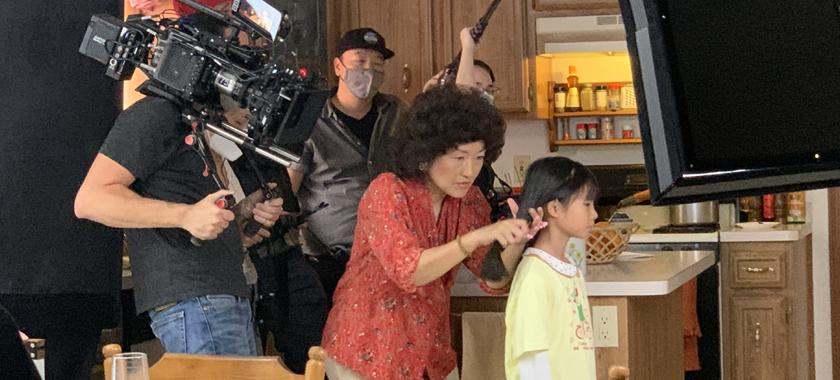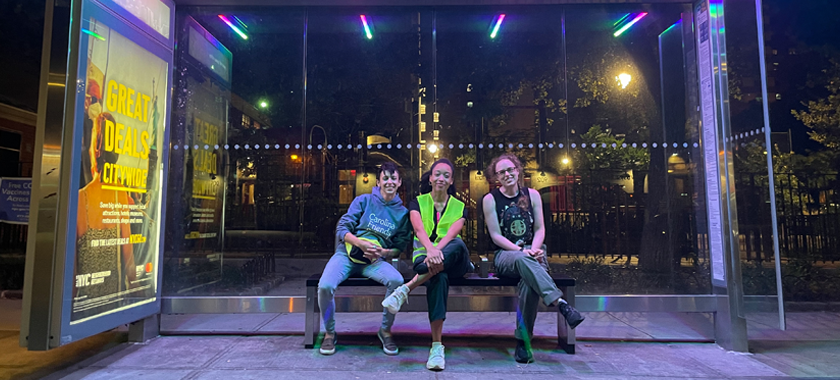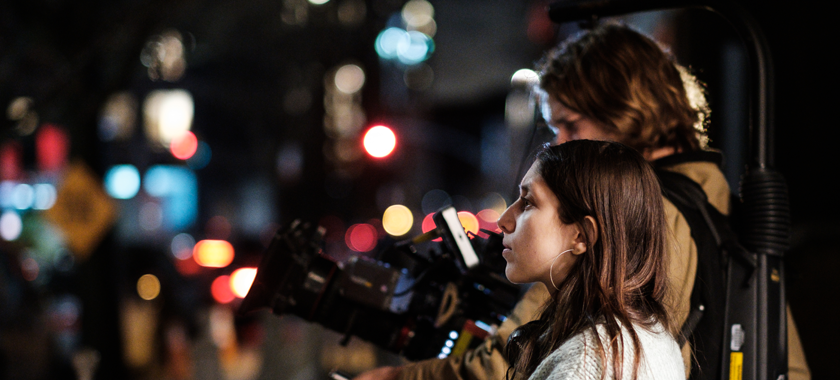
How to: Finish Financing Your Independent Film
Tips and resources for independent filmmakers who have managed to get a project off the ground, but still need money to finish it!
Getting independent projects funded can sometimes be the most challenging part of the filmmaking process, especially for emerging artists, women or non-binary filmmakers, and artists of color.
While securing financing for an independent film often occurs before the cameras start rolling, the reality is that independent filmmakers can find themselves needing additional funds at any stage of the process. Whether your project requires finishing funds, money to cover unforeseen circumstances, or payment of deferred wages, this post shares important tips, resources, and some words of wisdom to help you avoid disaster and raise funds to complete your film!
We’ve compiled advice from industry professionals Debra Zimmerman, Executive Director, Women Make Movies; Sofia Sondervan-Bild, Film and Television Producer and Adjunct Instructor at NYU Tisch School of the Arts; and Leah Natasha Thomas, Creative Producer, to help you get to the finish line. These insights are gathered from a NYFA panel discussion moderated by Judith Kenny, Director of Academic Affairs & Operations, the Film Department at Brooklyn College.
Getting Started
No matter how large or small a project, getting a good producer who will believe in and passionately represent the project is essential. Sondervan-Bild, who in addition to teaching at NYU is an Oscar-nominated producer at Dutch Tilt Films, emphasizes that the collaboration between producer and director is crucial for the success of the project. A good producer will advise on shoot locations, state tax credits, and the best time of year to cast for your film. Find someone who will stick with you through the ups and downs!
How do you find a good producer? Put yourself and your project out there in-person and online! Sondervan-Bild says: “As a producer, our most valuable asset is who we know.” Attend film festivals, mixers, industry events, premieres. When you’re there, be ready to talk about your film! Prepare an elevator pitch and introduce yourself to others. “Even if it’s not in your personality—do it for the sake of your movies.”
As a producer, our most valuable asset is who we know.
-Sofia Sondervan-Bild
Sondervan-Bild also recommends using resources like a 30-day free trial to IMDBPro to compile lists of potential collaborators whose work may fit your project. From there, make personal appeals to convince them that your project is the one they want to be making.
Once you find your collaborators, be sure to vet them carefully. Give plenty of time to get to know each other’s working habits and personalities and make sure they are the right fit for your project.

Make a Budget
Thomas, who recently produced jeen-yuhs: A Kanye Trilogy, shares her advice on getting started with your budget. She recommends deeply and specifically reflecting on the trajectory of your project, your intended audience, and where you want to see it live. Avoid thinking your audience should be as broad as possible as this limits your ability to effectively plan for your finished film. Is your audience young and digitally savvy? Or are they more old fashioned or analogue? Will it be viewed in a classroom, theater, in a shorts program at a festival, or on a specific streaming site?
Once you have an idea of where your film will go, you can reverse engineer from there to see what it would take to get to those people and that audience with your film. If your audience responds to social media, budget for a campaign. If your audience is a festival goer, budget for festival fees and materials to pass out as well as tickets to give to the people you want at that screening. Trace the project all the way back to the research phase to get a full view of what your project costs.
Thomas also cautions: “The producer sets the budget. If we’re getting cut, we’re all getting cut together.” Producing is a balancing act of managing personalities of directors, investors, timelines, and everything in between. It’s important to communicate clearly from the beginning and set up structures for sustainability so that the project can move forward without falling apart if/when a setback occurs.
Ask for What You Need
Zimmerman reiterates that this is an industry of relationships and reflects that this can be exclusionary to emerging artists. However, a silver lining to the pandemic is that you can now access resources and platforms online all over the world. While they can still be exclusive, there are many pitching platforms that filmmakers can pitch directly to industry folks including Camden’s Points North, Doclands DocPitch, and The Gotham. International pitching platforms include the Sheffield Meet Market in England, Docs Barcelona, and Sunnyside of the Doc in France.
Zimmerman advises putting together everything you’ll need for a strong proposal. This includes, but is not limited to, a synopsis, treatment, fundraising plan, bios of key artists, work samples, budget, and a marketing and distribution plan. Doing the work early on these commonly asked application questions will make applying for grants, fellowships, fiscal sponsorships, and even investment and crowdfunding much easier and help you to streamline communication about your project.
Recently, our panelists have encouraged filmmakers to create a pitch deck: a visual representation of your project to be funded. This is usually a PDF with short descriptions and lots of pictures. This is a great tool to get investors and collaborators interested in your project.
Once you have everything in place, ask for what you need. Arts and film organizations like NYFA, Cinereach, Chicken & Egg, The Gotham, Women Make Movies, and International Documentary Association are oftentimes generous with educational resources, hold affordable and free webinars or workshops, and may even offer grant programs.

Protect Yourself!
Many arts and film organizations offer Fiscal Sponsorship as a fundraising tool that gives access to an organization’s 501c3 status to apply for certain government or foundation funds meant for nonprofits as well as a tax-deduction for individual donors. This can also give some legitimacy and sense of security for your donors. If using a fiscal sponsor, read the bylines closely, do not give your Fiscal Sponsor creative control, and make sure you understand what they are asking of you and what advice or guidance you can ask from them.
For fiction features, Sondervan-Bild recommends getting a completion bond, a form of film investor insurance, to protect against unforeseen circumstances. This will help protect a producer’s reputation and finances.
Sondervan-Bild also cautions that if a potential investor sounds too good to be true, they probably are. The film industry can seem glamorous, but you need to be careful. Just like if you were renting your apartment, Sondervan-Bild recommends asking for a bank statement, doing a credit check, calling references, and asking for letters from prior collaborators. You can look them up on IMDB to see if they’ve funded a film before.
Lastly, Thomas suggests working closely with a lawyer to develop documents and materials that your investors will sign that clearly defines the role they will have on the project. There should not be confusion over whether or not an investor will have editorial control if the producer sets the tone early on, with signatures on documents to back up these decisions. Can’t afford a lawyer yet? Check out Lawyers for the Creative Arts or similar resources online.
In Conclusion
Some other words of advice? Zimmerman says “Take great photos. Finish your film and have something that you can use to sell the film. It’s so important and most filmmakers don’t think about it when they’re in production.”
Sondervan-Bild adds to stick with the vision. You should believe in the work and the artistic team and when complicated setbacks or delays happen, be ready to pick back up. “It’s a puzzle! And sometimes it fits and you’re done, and sometimes it can take longer.”
It’s a puzzle! And sometimes it fits and you’re done, and sometimes it can take longer.
-Sonia Sondervan-Bild
Financing your film can be a long and emotional process, with many highs and lows. Do your research, have a solid team collaborating with you, and stay hopeful! Thomas reminds “Your job is to persevere.” Figure out whatever it is that you need to stay in the game and keep going. There will be many challenges, but ultimately you need to do what is best for your project.
–Compiled by Anna Wang, Program Officer, NYFA Grants
This panel discussion is supported by the City of New York Mayor’s Office of Media and Entertainment (MOME) as part of the NYC Women’s Fund for Media, Music and Theatre.
Interested in more film resources? Visit our “For Filmmakers” page. Sign up for our bi-weekly newsletter to receive artist resources and upcoming events straight to your inbox.